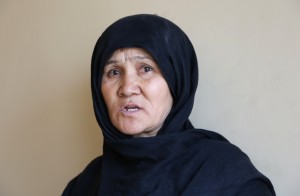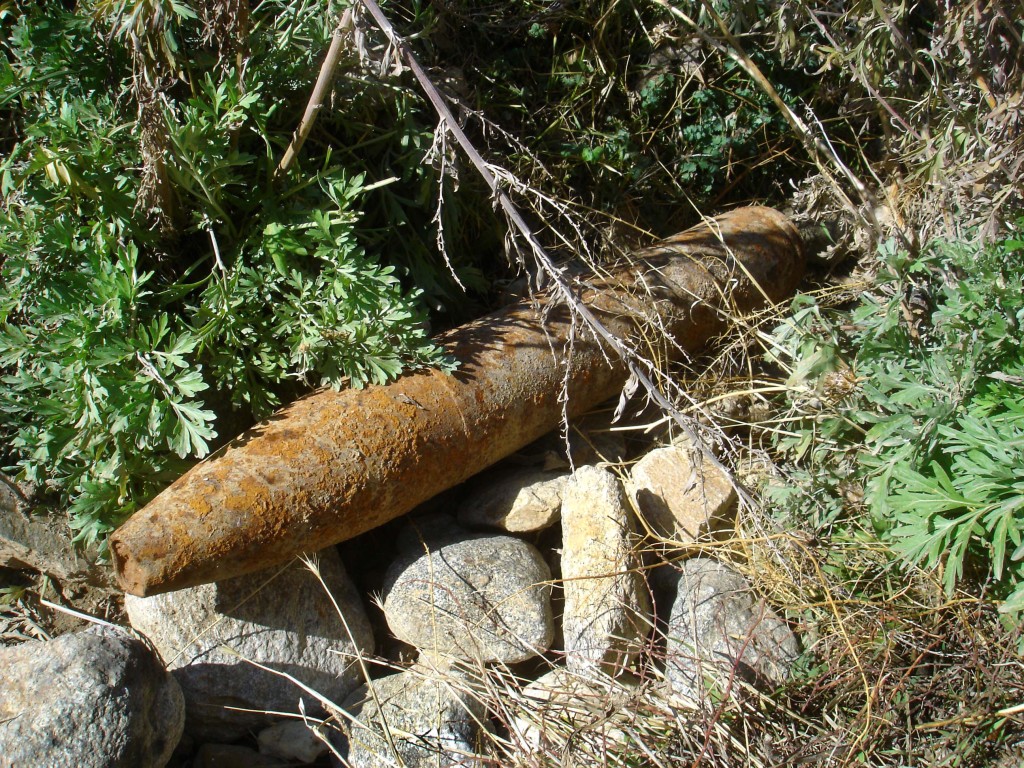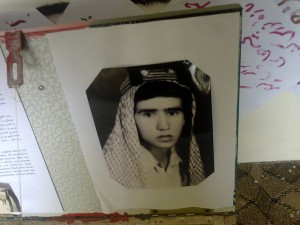Years of war have turned Afghanistan into one of the most mined countries in the world. Landmines have killed and maimed tens of thousands. In this testimony, 28-year-old Mahro recalls the day she came upon unexploded ordnance that robbed her of her sight and the use of one hand.
In 1994, the [...]]]>
Years of war have turned Afghanistan into one of the most mined countries in the world. Landmines have killed and maimed tens of thousands. In this testimony, 28-year-old Mahro recalls the day she came upon unexploded ordnance that robbed her of her sight and the use of one hand.
In 1994, the family was living in Qala-e-Haidar Khan next to Arghandi in Kabul province. They owned cows, and the sale of milk was their main livelihood. As the youngest, it was Mahro’s job to take the cows out to pasture. She remembers how, on one fateful day, she was grazing the family’s cows near a military post with her aunt’s son. “He pulled out something that was half buried in the ground, and hit it with a stone,” she remembers. When the landmine exploded, her cousin, only a bit older than she, died in the blast.
Every side in the successive rounds of fighting in Afghanistan has planted anti-personnel mines. They have been laid in residential areas and on agricultural land. Landmines were planted by the communist regime of President Najibullah, during the fighting with U.S.-supported mujahedin groups. The mujahedin, in turn, mined tracks to villages to prevent the advance of Soviet tanks. Further mine-laying took place between 1996 and 2001 during the conflict between the Taliban government and the Northern Alliance led by Ahmad Shah Massoud. Even today 45 people on average lose their limbs every month to deadly anti-personnel mines, according to Engineer Abdul Wakil, head of the Mine Action Coordination Centre of Afghanistan.
Littered with landmines
Mahro says it was a soldier who had pointed out the grassy knoll by the military post and told the children to take the cows there. “My cousin knew the area well. He had found shards of artillery there. But he did not know the grass could be hiding unexploded landmines,” she says.
Mahro says at the time of the incident a war was raging between mujahedin groups. “There were no Christians or Jews in Afghanistan. The war was among the mujahedin.” Christians and Jews is a reference to the U.S.-led international troops in the country since 2001.
Mahro’s father, who did not want his name revealed, describes it as a time when everyone was armed. He is matter of fact when he recalls the accident that changed his daughter’s future. “They (Mahro and her cousin) were foolish,” he says without a trace of emotion on his face. “They went to a military post, and hit a mine with a stone. The boy was killed and the girl lost her eyes.”
For 40 days, Mahro was in hospital. Her father says she drifted between life and death.
“She had suffered grave injuries, and we rushed her to the Jamhuriat Hospital. But when she was not getting better, we moved her to Sehat-e-Tefel (Indira Gandhi Children’s Hospital in Kabul).”
Utter frustration
At first it seemed one of her eyes could be saved, but doctors operated because they feared her brain would suffer permanent damage. After 40 days the Red Crescent flew Mahro to Germany for further treatment. She learnt how to use her lame hand, but her blindness was beyond treatment.
“I returned to the country after one year. I was in depression, though I was only a child,” Mahro remembers. “I did not have a specific problem, I was free to move around the house, but I was very sad.”
One problem that nagged her was the fact that she could not recall parts of the Holy Quran and some of Hafiz’s poems (a great Persian poet) that she had learnt by heart before the accident. “I would keep telling my family I have forgotten whatever I’ve learnt.”
Slowly she adapted to living without the gift of sight. What she had forgotten, she relearnt with the help of an aunt, uncle and two siblings. She learnt the holy book by heart – the commentary, translation and rules of reciting. “I was always interested in the Holy Quran,” she says, recalling how she stayied with a relative for eight months to study it. He was also Hafiz – one who has learnt the Holy Quran by heart, she says. “I stayed for eight after she got out of the hospital. “When I returned home, I kept learning.,” she says, until, with the help of cassette tapes, she finally mastered the full 30 chapters.
Since 2007 she has been a teacher of the holy book. Now 28, she lives in Kabul’s Gulbagh area where she teaches more than 40 students. “I don’t know how many students I’ve taught,” she says modestly. But to her students, she’s a teacher like any other.
*Kreshma Fakhri writes for Killid, an independent Afghan media group in partnership with IPS. By distributing the testimonies of survivors of war through print and radio, Killid strives for greater public awareness about people’s hopes and claims for justice, reconciliation and peace across Afghanistan.
]]>Esmatullah Mayar writes for Killid, an independent Afghan media group in partnership with IPS. By distributing the testimonies of survivors of war through print and radio, Killid strives for greater public awareness about people’s hopes and claims for justice, reconciliation and peace across Afghanistan. In this testimony, 55-years-old Mahparwar remembers Shab-e-Barat, “the Night of Forgiveness”, is an [...]]]>
Esmatullah Mayar writes for Killid, an independent Afghan media group in partnership with IPS. By distributing the testimonies of survivors of war through print and radio, Killid strives for greater public awareness about people’s hopes and claims for justice, reconciliation and peace across Afghanistan. In this testimony, 55-years-old Mahparwar remembers Shab-e-Barat, “the Night of Forgiveness”, is an Islamic holiday celebrating God’s mercy. People pray for forgiveness for those who died. It was on one such night of forgiveness, 21 years ago, that Mahparwar’s younger brother was killed by the mujahedin.
Mahparwar’s brother Mohammad Shafi was a cycle repairer in Kabul. The 19-year-old had just married a year earlier “And had a pair of twins — a daughter and son,” his sister recalls. He had no connection with any political party, she stressed, saying he was neither a member of Khalq nor Parcham — two communist parties that ruled Afghanistan after the assassination of president Daud Khan in April 1978. “He did not have a job with the government or any organisation.”
It was last days of the regime of President Najibullah, (1987 -1992) and the war between government forces and jihadist parties had engulfed the country, remembers Mahparwar. It was the 15th of Shoban, 1370 (July 5, 1991 in the Gregorian calendar), as they celebrated Shab-e-Barat, when tragedy struck.
“My brother was travelling to Jalalabad when armed people (mujahedin) came down from the mountains in Mashal Kandaw (on the highway between Kabul and Jalalabad), abducted and killed him immediately.”
His killers left his body on the roadside and fled, says Mahparwar.
“We got to know about his murder on Barat night but we could not find his body. My other brothers searched all over. Some of our relatives said they had seen our brother in their dreams, and we should search for him in the places they mentioned.
Her brothers searched everywhere. In the end they found him in a hospital mortuary.
Death of innocents
Mahparwar had been kept unaware, she says. “All they told me was that Shafi was injured, and was found in the Kabul hospital. But when I went to my father’s house I saw a friend of my brother, a soldier in the army, weeping loudly.”
“We buried him in Charqala village of Chardehe (Kabul province). My mother has not been well ever since.”
Shafi was the cleverest and most hardworking of her siblings says Mahparwar, working in his bicycle repair shop steadily through the winter and long hot summer. He did not waste his time in idle gossip, she says.
her sister-in-law, Shafi’s wife, finally remarried and took their son with her. “His name is Sahel, he looks very much like my brother,” she adds.
The situation in Kabul, meanwhile, went from bad to worse when Najibullah’s government was toppled by mujahedin forces, who then turned on one another. People fled the city in the tens of thousands. Mahparwar, too, became a refugee in Peshawar.
Bad news continued to pour across the border. “There was not one day when we did not hear of the death of relatives in Afghanistan. My younger sister’s husband was killed in the war between Hezb Islami and the Hezb-e-Islami led by General Dostum in Mazar-e-Sharif.”
Lost futures
In her childhood she had built castles in the air for her family, says Mahparwar, but the warlords “dashed everyone’s dreams and hopes”. All three of her brothers are poor, she says, one is a taxi driver, the other a labourer. A third is a mechanic. “The war took everything from us.”
Mahparwar’s children go to school, and she says she is happy for them. But she continued to be haunted by the fact that her brother’s killers are still free. “Arrest the murderers of my brother. Arrest the murderers of many others as well. They should be tried,” She says.
“They made us weep. They took away our breadwinners from us.” While her brother died on the night of forgiveness, for Mahparwar forgiveness is not within her reach, she says.
Instead, she wants for the stories of three decades of war to be told and remembered. She wasnts the to be collected and archived, so that “Future generations can see how our country was tyrannised,” she says.
Today, Mahparwar is a member of the Women’s Council in Chehelsotoon, in Kabul city, which was set up to support survivors of war.
]]>

Rahima lived in Iran as a refugee for seven years. She returned to Kabul in 2007. Photo: Najibullah Musafer/Killid
At the start of the war between the Taliban and mujahedin in 1996, Rahima lived with her family in Kabul’s Qala Jernail.
Emerging out of madrasas along Pakistan’s border with Afghanistan, the Taliban that year marched into Kabul and ousted mujahedin Ahmad Shah Massoud.
At the time, the mujahedin were in power under an agreement brokered between the different factions by the West after the collapse of the communist government of president Najibullah. But the agreement collapsed within months, leaving Kabul — which had survived the earlier years of war between the communists and the mujahedin – to be torn apart by rival guerrilla factions fighting for control over the city. In fact, the bloodshed was so terrible that Kabul residents welcomed the more disciplined Taliban fighters when they seized power and drove out the mujahedin.
But as history has shown that relief was short-lived.
Rahima says her family had lived peacefully in Kabul until the war broke ou.Her husband was a daily wage worker and they had a good enough life.
As the Taleban fought their way into Kabul, there was an exodus of civilians from the city, but Rahima’s family could not leave, because her husband had been jailed. “[The Taliban] jailed my labourer husband, and took him away to Paghman,” she says. He was finally released because they could not find any reason to keep him.
Turning breadwinner
The couple and their four children fled to safety to a village outside Mazar-e-Sharif called Babayadgar, where they lived for two years until the war caught up with them. The noise of rockets and rifles one night announced the arrival Taliban, eliminating anyone who crossed their path.
“They took my husband to a garden,” Rahima recalls of the day her husband was picked up. “We had no news of him for two days. Then we heard that a body was found in the garden — I went and identified it as his.”
Her husband gad been brutally tortured, his chin smashed with the butt of a rifle, his arms and legs broken.
Rahima brought her husband’s body home, washed and buried him with the help of neighbours. When she arrived back home, intruders forced their way into the house, burning everything.
The scared family fled into the desert until a modicum of calm had returned to the village. When they came back to their ruined home, Rahima had no money to buy even a bag of flour.
“The sky was far and the ground hard,” she says, reciting an Afghan proverb about the difficulty of the situation they faced.
A shopkeeper took pity on the family, and gave them loaves of bread to eat every night. But Rahima did not want to live only on charity. She made use of the relative security in Babayadgar to find work spinning cotton, sewing quilts and washing clothes – jobs that brought her small amounts of money.
The family succeeded in keeping hunger at bay, but the bitter cold of winter had to be endured. “We were putting on gloves and hats inside the house. Sometime we would put the lantern under the quilt to reduce the cold. We had no heater or stove to keep ourselves warm, and except God no one was there to help us in the city.”
Lucky break
In 2000 they made the journey back to Kabul. But faced with no prospect of work – women were not allowed to work under the Taliban – Rahima took the help of an “agent” to cross over into Iran with her children. She lived in Iran for seven years as a refugee, doing all kinds of work from washing carpets to factory jobs, to put her two daughters through school while her sons worked.
In 2007 she returned to Kabul having heard that the Karzai government was giving financial assistance to widows. She says she did not know that “such a fruit needs long hands to get”, meaning it was out of the reach of the poor. “We heard (in Iran) that Karzai was donating land to widows so we returned. When we came here we got no help from Karzai or the government.”
But luck was on her side in the form of new employment. Today, Rahima works in the office of the Killid Group where she is knows as “Aunt Fatima” and counted among its most hardworking and loyal staff.
*** Ali Arash writes for Killid, an independent Afghan media group in partnership with IPS. By distributing the testimonies of survivors of war through print and radio, Killid strives for greater public awareness about people’s hopes and claims for justice, reconciliation and peace across Afghanistan.
]]>
